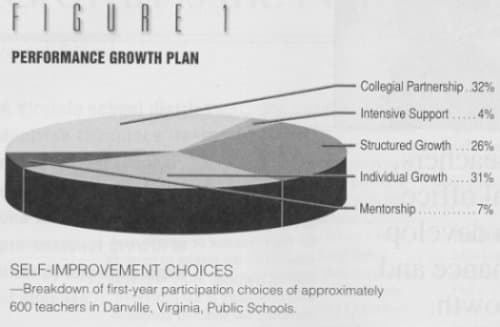Do traditional checklist evaluations enhance teacher performance? Doesn't this type of ranking-and-rating system conflict with the work of Deming, Glasser, Senge, and others? Why would we keep doing something that, according to many experts, simply doesn't work? Questions like these prompted the Danville Public Schools to replace its traditional teacher evaluation system with a Performance Growth Plan. For several months, teachers, principals, and central office administrators met to develop a plan that would enhance and promote teachers' growth.
Our Dialogue Begins
Fear, lack of trust, and heavily bureaucratic practices, we discovered, were some of the barriers to real teacher improvement. Teacher after teacher stated that the traditional system did little or nothing to improve teaching and, subsequently, student learning. In unstructured interviews, teachers flatly stated that the process had become a “meaningless ritual” and “a waste of time.”
- Growth and development are best achieved in an environment marked by mutual respect and trust.
- Teachers are professionals and will make responsible decisions about their growth and development.
- Teachers will provide a caring classroom environment for all students in an atmosphere that facilitates learning.
- Reflection and analysis are essential for the professional growth of teachers and the successful practice of teaching.
The Plan Moves Ahead
Moving forward, we investigated quality concepts such as continuous improvement. We built upon Duke's (1993) concept of professional growth choices, coupled with collegial networking as essential foundations for employee commitment to the growth plan. Books by Peter Senge (1990) and Margaret Wheatley (1992) stimulated further discussions about organizational learning and continuous change. As the plan grew in scope, the design team—realizing the importance of continuous fine-tuning—agreed to meet mid-year for a formal review of our progress.
School boards that understand the importance of their support to professional growth are rare. At Danville Public Schools, we were indeed fortunate to have a board that encouraged our efforts. We gave every board member working copies of the plan as it developed and welcomed their input along the way. Our efforts gained further momentum after the board explored continuous improvement and other quality concepts at its retreat. Ultimately, the teachers' enthusiasm about the Performance Growth Plan contributed to unanimous approval from the school board.
The Performance Growth Plan
- The structured growth component, required of all nontenured teachers (although they may choose other components as well), is a traditional method of observation and feedback. Principals and teacher advisors observe and meet with a nontenured teacher to dialogue and offer feedback. The focus is on formative recommendations and commendations.
- In the collegial partnership component, two or more teachers work together to better understand teaching and learning. Activities may include classroom observations, reviews of the literature, and open discussion of various facets of their profession.
- Teachers who opt for the mentorship component select a teacher or teachers to advise, support, observe, and confer with them toward a plan of improvement.
- Teachers who choose the individual growth component develop a personalized plan for continuous growth. Elements might include completing a college course, conducting research, or implementing a new instructional program.Components 2, 3, and 4 include collaborative planning and conferencing between the teacher and the principal. Together, they develop a plan, identify strategies for improvement or growth, and summarize the results in terms of student learning. More important than procedure is the process of nurturing the states of growth in professionals. Throughout the year, the principal is available to confer with individuals or groups, to offer continuous informal feedback, and to advise, support, and monitor growth.
- The intensive support component is initiated by the principal (but can be requested by a teacher) based upon written, specific reasons documenting serious problems with a teacher's performance. A clearly developed improvement plan identifies goals, available support, and time lines. In addition, the teacher has the option of requesting a support team made up of one professional selected by the teacher and one by the principal. The team offers specific mentoring and directive support. A teacher's failure to respond to the intensive support will affect his or her continued employment.
The Growth Plan in Action
- A high school special education department joined together in a collegial partnership to improve communication with parents. The effort resulted in two very well attended evening sessions in which dialogue occurred and teamwork between parents and teachers really took off.
- An elementary teacher developed an individual growth plan, which involved soliciting input from former students over a three-year period. Specifically, she asked for their perspectives about what aspects of the curriculum and teaching were of particular value to them as middle school students. The students responded enthusiastically and offered specific recommendations that the teacher incorporated into her planning.
- A first-year teacher teamed with an accomplished veteran to learn more about improving classroom management. As a result of the yearlong mentorship, the first-year teacher developed a strong foundation for classroom management, and the veteran teacher's enthusiasm was rekindled by the newer teacher's unbridled belief in all children.
- Many first-year and nontenured teachers who participated in the structured growth component appreciated the new plan's focus on growth rather than ratings. As a result, they felt more supported in their efforts toward continuous growth than they did when participating in a one-hour semi-annual process.
- A teacher assigned to intensive support, though at first unwilling and disgruntled, made great strides in improving her classroom management and instructional delivery. The intensive peer-team support, as well as the realization that failure to improve would result in dismissal, motivated her to improve her performance.
Figure 1. Performance Growth Plan

Will It Work?
Will Danville's move from monitoring teachers' performance to focusing on professional growth succeed? We believe it will. Along the way, teachers will try out some new things that may not work, but that's okay. If we respect our teachers and believe they are capable of making professional choices about their growth—and we do—our students will reap the benefits... and teachers will grow.
